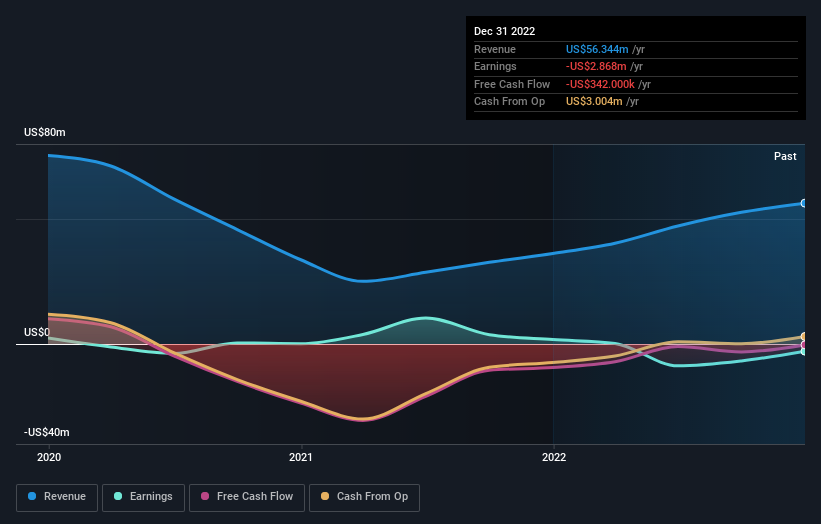The InterGroup Corporation (NASDAQ:INTG) insiders have significant skin in the game with 70% ownership
Key Insights
Significant insider control over InterGroup implies vested interests in company growth
John Winfield owns 66% of the company
Using data from company's past performance alongside ownership research, one can better assess the future performance of a company
If you want to know who really controls The InterGroup Corporation (NASDAQ:INTG), then you'll have to look at the makeup of its share registry. And the group that holds the biggest piece of the pie are individual insiders with 70% ownership. In other words, the group stands to gain the most (or lose the most) from their investment into the company.
So, insiders of InterGroup have a lot at stake and every decision they make on the company’s future is important to them from a financial point of view.
In the chart below, we zoom in on the different ownership groups of InterGroup.
Check out our latest analysis for InterGroup
What Does The Institutional Ownership Tell Us About InterGroup?
Institutional investors commonly compare their own returns to the returns of a commonly followed index. So they generally do consider buying larger companies that are included in the relevant benchmark index.
Institutions have a very small stake in InterGroup. That indicates that the company is on the radar of some funds, but it isn't particularly popular with professional investors at the moment. So if the company itself can improve over time, we may well see more institutional buyers in the future. It is not uncommon to see a big share price rise if multiple institutional investors are trying to buy into a stock at the same time. So check out the historic earnings trajectory, below, but keep in mind it's the future that counts most.
We note that hedge funds don't have a meaningful investment in InterGroup. Looking at our data, we can see that the largest shareholder is the CEO John Winfield with 66% of shares outstanding. This implies that they possess majority interests and have significant control over the company. Investors usually consider it a good sign when the company leadership has such a significant stake, as this is widely perceived to increase the chance that the management will act in the best interests of the company. With 2.6% and 2.2% of the shares outstanding respectively, Caldwell Securities Incorporated, Asset Management Arm and William Nance are the second and third largest shareholders. Interestingly, the third-largest shareholder, William Nance is also a Member of the Board of Directors, again, indicating strong insider ownership amongst the company's top shareholders.
Researching institutional ownership is a good way to gauge and filter a stock's expected performance. The same can be achieved by studying analyst sentiments. We're not picking up on any analyst coverage of the stock at the moment, so the company is unlikely to be widely held.
Insider Ownership Of InterGroup
While the precise definition of an insider can be subjective, almost everyone considers board members to be insiders. The company management answer to the board and the latter should represent the interests of shareholders. Notably, sometimes top-level managers are on the board themselves.
Insider ownership is positive when it signals leadership are thinking like the true owners of the company. However, high insider ownership can also give immense power to a small group within the company. This can be negative in some circumstances.
It seems that insiders own more than half the The InterGroup Corporation stock. This gives them a lot of power. Given it has a market cap of US$101m, that means they have US$70m worth of shares. Most would argue this is a positive, showing strong alignment with shareholders. You can click here to see if those insiders have been buying or selling.
General Public Ownership
With a 26% ownership, the general public, mostly comprising of individual investors, have some degree of sway over InterGroup. While this group can't necessarily call the shots, it can certainly have a real influence on how the company is run.
Next Steps:
While it is well worth considering the different groups that own a company, there are other factors that are even more important. Take risks for example - InterGroup has 2 warning signs we think you should be aware of.
Of course this may not be the best stock to buy. So take a peek at this free free list of interesting companies.
NB: Figures in this article are calculated using data from the last twelve months, which refer to the 12-month period ending on the last date of the month the financial statement is dated. This may not be consistent with full year annual report figures.
Have feedback on this article? Concerned about the content? Get in touch with us directly. Alternatively, email editorial-team (at) simplywallst.com.
This article by Simply Wall St is general in nature. We provide commentary based on historical data and analyst forecasts only using an unbiased methodology and our articles are not intended to be financial advice. It does not constitute a recommendation to buy or sell any stock, and does not take account of your objectives, or your financial situation. We aim to bring you long-term focused analysis driven by fundamental data. Note that our analysis may not factor in the latest price-sensitive company announcements or qualitative material. Simply Wall St has no position in any stocks mentioned.
Join A Paid User Research Session
You’ll receive a US$30 Amazon Gift card for 1 hour of your time while helping us build better investing tools for the individual investors like yourself. Sign up here


